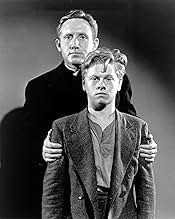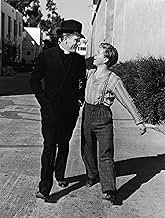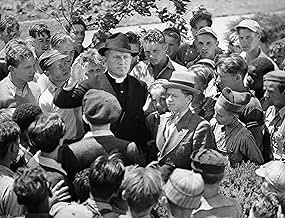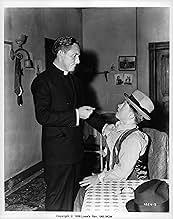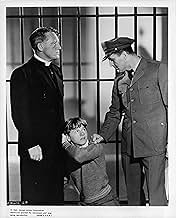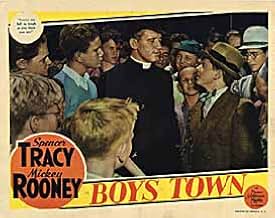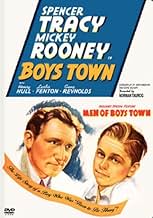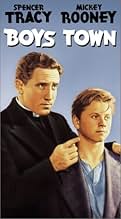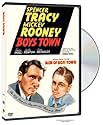IMDb रेटिंग
7.2/10
6.7 हज़ार
आपकी रेटिंग
अपनी भाषा में प्लॉट जोड़ेंWhen a death row prisoner tells him he wouldn't have led a life of crime if only he had had one friend as a child, Father Edward Flanagan decides to start a home for young boys.When a death row prisoner tells him he wouldn't have led a life of crime if only he had had one friend as a child, Father Edward Flanagan decides to start a home for young boys.When a death row prisoner tells him he wouldn't have led a life of crime if only he had had one friend as a child, Father Edward Flanagan decides to start a home for young boys.
- 2 ऑस्कर जीते
- 6 जीत और कुल 4 नामांकन
Victor Kilian
- The Sheriff
- (as Victor Killian)
Boys Town Acapella Choir
- The Choir
- (वॉइस)
- (as Boys Town A Cappella Choir)
फ़ीचर्ड समीक्षाएं
SPENCER TRACY underplays the role of Father Flanagan who was the man behind the creation of BOYS TOWN and yet Hollywood thought his performance deserved an Oscar in 1938. The film looks very dated now and the sentiment is laid on a bit thick. The delinquent boys seem more like stereotyped cardboard characters dreamed up by the scriptwriter with only occasional glimmers of truth in the acting.
Best among the supporting cast are GENE REYNOLDS (always a fine child actor who later turned his talents to directing) and little BOBS WATSON, who does a remarkably convincing job of playing the little boy who worships "Whitey," played by MICKEY ROONEY. Rooney's performance is a bit too blustery but there are moments when his acting nails the truth.
Still, it's hard to know how much "truth" there is in the story told here, since so much of the script seems to depend on contrivances that make one suspect it's a purely fictionalized account of the actual story behind the development of Flanagan's Boys Town. Anyone with a fondness for Tracy and Rooney will find it easy enough to sit through, but I don't think it's the finest work of either star.
Best among the supporting cast are GENE REYNOLDS (always a fine child actor who later turned his talents to directing) and little BOBS WATSON, who does a remarkably convincing job of playing the little boy who worships "Whitey," played by MICKEY ROONEY. Rooney's performance is a bit too blustery but there are moments when his acting nails the truth.
Still, it's hard to know how much "truth" there is in the story told here, since so much of the script seems to depend on contrivances that make one suspect it's a purely fictionalized account of the actual story behind the development of Flanagan's Boys Town. Anyone with a fondness for Tracy and Rooney will find it easy enough to sit through, but I don't think it's the finest work of either star.
Spencer Tracy and Mickey Rooney star in the 1938 classic, Boys Town. Based in a real-life Home for Boys in Nebraska, Spencer Tracy would win Best Actor at the Acadmey Awards for his performance. Mickey Rooney, at the age of 18 wins the audience over, although it is Spencer Tracy that is hailed the lead actor as the noble and always wise Priest. Rooney plays the tough guy / teenage hell-raiser who ends up becoming a nice boy. His addition to Boys Town is followed by a series of knocks and explosions. The family atmosphere of Boy's Town is the true winner of the movie. Watching Rooney slowly become of the family of forgotten boys wins your heart. Spencer Tracy is only the star of the movie, it is Rooney who is the movie.
The film takes a long time to get going - I almost gave up on it after the first half-hour. But mercifully, after the documentary-style and resolutely non-judgmental opening, "Boys Town" acquires a plot - and some sense of direction. The trigger for this is the introduction of the first character in the entire film who is allowed to be flawed. So far, everyone else has been shown to be either a curmudgeon with a heart of gold, a rascal with a heart of gold, or an unashamed saint; but Joe Marsh is a flashy and unrepentant young criminal.
He is not entirely beyond redemption, however. He loves his younger brother, who hero-worships him in turn and longs to emulate him; and it is doubtless a sad reflection on human nature that it is only with the arrival of strife in the Eden of Boys Town, in the shape of Joe and Whitey Marsh, that the film manages to become at all interesting.
What follows is a story that has been told many times before, from Louisa May Alcott's "Jo's Boys" onwards. This is the story of a rough boy who rebels against unaccustomed gentle surroundings and tries to corrupt his new world to match the one he knows, and whose ultimate saving grace is his protective love for a younger child.
The main problem for this film is the role of Father Flanagan, a thankless part for any actor. The man has - literally - no weaknesses, no human flaws, not even any self-doubt. His charm can apparently melt the hardest heart and conjure water out of a stone - or out of a hard-headed pawnbroker, which according to the script comes to the same thing. The man is too likeable to be 'insufferable'; but it was surely not the intention of the director that the audience should end up by willing Whitey to resist the priest's moral pressure, to shield his brother even at his own expense and that of his adopted community - and to be so pleased when the boy attempts to do so.
To be honest, I don't see that this part deserved to win an Oscar for Spencer Tracy - not because the actor played badly, but because the character as written simply doesn't present him with enough challenging material to demonstrate his craft. It is the child actors who play the various boys who deserved the real praise in this film. Ultimately I suspect Tracy's Oscar was an award aimed at rewarding the efforts of the *real* Father Flanagan rather than at his performance in this film.
He is not entirely beyond redemption, however. He loves his younger brother, who hero-worships him in turn and longs to emulate him; and it is doubtless a sad reflection on human nature that it is only with the arrival of strife in the Eden of Boys Town, in the shape of Joe and Whitey Marsh, that the film manages to become at all interesting.
What follows is a story that has been told many times before, from Louisa May Alcott's "Jo's Boys" onwards. This is the story of a rough boy who rebels against unaccustomed gentle surroundings and tries to corrupt his new world to match the one he knows, and whose ultimate saving grace is his protective love for a younger child.
The main problem for this film is the role of Father Flanagan, a thankless part for any actor. The man has - literally - no weaknesses, no human flaws, not even any self-doubt. His charm can apparently melt the hardest heart and conjure water out of a stone - or out of a hard-headed pawnbroker, which according to the script comes to the same thing. The man is too likeable to be 'insufferable'; but it was surely not the intention of the director that the audience should end up by willing Whitey to resist the priest's moral pressure, to shield his brother even at his own expense and that of his adopted community - and to be so pleased when the boy attempts to do so.
To be honest, I don't see that this part deserved to win an Oscar for Spencer Tracy - not because the actor played badly, but because the character as written simply doesn't present him with enough challenging material to demonstrate his craft. It is the child actors who play the various boys who deserved the real praise in this film. Ultimately I suspect Tracy's Oscar was an award aimed at rewarding the efforts of the *real* Father Flanagan rather than at his performance in this film.
Father Flanagan courageously fights against all odds to see his dream of BOYS TOWN become a reality.
Pulsing with real life, here is a family film which not only entertains but informs - bringing back to our attention one of the most vibrant personalities of the 20th Century, Father Edward Flanagan. Excellent production values - with outdoor filming that actually appears to have taken place on location at the authentic Boys Town - help tremendously with the viewer's enjoyment.
Earning his second Oscar in two years, Spencer Tracy is magnificent as the good Father. He gives us a hero of patience & grace, one who values prayer & faith, but one who is also quite ready to land a few powerful punches for a good cause. Tracy's own private life was anything but tranquil, which only makes his performance here all the more impressive.
Admirably cast as a nasty little punk, young Mickey Rooney breezes through an important role which would help propel him into becoming Hollywood's top star within a couple of years. Like a junior version of Tracy himself, the two are wonderful together, striking several dramatic sparks off their characters' personalities. While Tracy plays his role with quiet humor & dignity, Rooney hams it up magnificently.
Henry Hull offers good support as Tracy's pawnbroker friend who nervously gets to worry about all of Boys Town's financial woes. Little Bobs Watson as Pee Wee, the Town's youngest resident, is cute without being too cloying.
*************************
After an education in Rome, Irish-born Edward Joseph Flanagan (1886-1948) came to America in 1904. Ordained a priest in 1912, Father Flanagan was sent to Omaha, Nebraska, where he established the Workingmen's Hotel for derelict men in 1914.
Soon, however, his great calling and the purpose for his life's ministry became clear - the work with abandoned & abused boys. In 1917 Father Flanagan opened the Home for Homeless Boys in a large old house. Outgrowing their facilities, in 1921 Father Flanagan moved his young charges to a farm site 10 miles from Omaha, capable of housing hundreds of youths. Quickly becoming more of a living community than just a school, the boys voted in 1926 to rename the place Boys Town.
Eventually covering some 1300 acres of farmland, dormitories, workshops, classrooms & playing fields, Boys Town incorporated itself as a sovereign township in 1936. Largely governed by the young men themselves, the institution is open to boys of all religions, colors & creeds and strives to provide healing for all manner of emotional & physical abuses.
Girls were first brought into the program in 1979.
Pulsing with real life, here is a family film which not only entertains but informs - bringing back to our attention one of the most vibrant personalities of the 20th Century, Father Edward Flanagan. Excellent production values - with outdoor filming that actually appears to have taken place on location at the authentic Boys Town - help tremendously with the viewer's enjoyment.
Earning his second Oscar in two years, Spencer Tracy is magnificent as the good Father. He gives us a hero of patience & grace, one who values prayer & faith, but one who is also quite ready to land a few powerful punches for a good cause. Tracy's own private life was anything but tranquil, which only makes his performance here all the more impressive.
Admirably cast as a nasty little punk, young Mickey Rooney breezes through an important role which would help propel him into becoming Hollywood's top star within a couple of years. Like a junior version of Tracy himself, the two are wonderful together, striking several dramatic sparks off their characters' personalities. While Tracy plays his role with quiet humor & dignity, Rooney hams it up magnificently.
Henry Hull offers good support as Tracy's pawnbroker friend who nervously gets to worry about all of Boys Town's financial woes. Little Bobs Watson as Pee Wee, the Town's youngest resident, is cute without being too cloying.
*************************
After an education in Rome, Irish-born Edward Joseph Flanagan (1886-1948) came to America in 1904. Ordained a priest in 1912, Father Flanagan was sent to Omaha, Nebraska, where he established the Workingmen's Hotel for derelict men in 1914.
Soon, however, his great calling and the purpose for his life's ministry became clear - the work with abandoned & abused boys. In 1917 Father Flanagan opened the Home for Homeless Boys in a large old house. Outgrowing their facilities, in 1921 Father Flanagan moved his young charges to a farm site 10 miles from Omaha, capable of housing hundreds of youths. Quickly becoming more of a living community than just a school, the boys voted in 1926 to rename the place Boys Town.
Eventually covering some 1300 acres of farmland, dormitories, workshops, classrooms & playing fields, Boys Town incorporated itself as a sovereign township in 1936. Largely governed by the young men themselves, the institution is open to boys of all religions, colors & creeds and strives to provide healing for all manner of emotional & physical abuses.
Girls were first brought into the program in 1979.
It doesn't matter what movie you're talking about, the guy just never had an inauthentic moment on film.
He could be playing priests, professors, attorneys, soldiers, homeless guys, doesn't make a difference. He was always believable and interesting to watch. I cherish these actors because they're rare. It's interesting to me that he was with Katherine Hepburn because she's another like him. Completely authentic in everything she did.
Meryl Streep is another one. Montgomery Clift. Jimmy Stewart. Kathy Bates. Henry Fonda. They're rare. The only modern one I can think of who is pretty consistent and not retired yet is Denzel Washington. Definitely Morgan Freeman but not sure if he's retired. Michael Caine just retired.
He could be playing priests, professors, attorneys, soldiers, homeless guys, doesn't make a difference. He was always believable and interesting to watch. I cherish these actors because they're rare. It's interesting to me that he was with Katherine Hepburn because she's another like him. Completely authentic in everything she did.
Meryl Streep is another one. Montgomery Clift. Jimmy Stewart. Kathy Bates. Henry Fonda. They're rare. The only modern one I can think of who is pretty consistent and not retired yet is Denzel Washington. Definitely Morgan Freeman but not sure if he's retired. Michael Caine just retired.
क्या आपको पता है
- ट्रिवियाFather Edward Flanagan, who died almost ten years after this movie was released, was the first person ever to live to see somebody win an Oscar for portraying him.
- गूफ़The blackface Whitey wipes off in line doesn't match when he arrives back at the barber.
- भाव
Father Edward J. Flanagan: I know that a mother can take a whip to the toughest boy in the world, and he forgets it because he knows that she loves him.
- इसके अलावा अन्य वर्जनAlso available in a computer colorized version.
- कनेक्शनEdited into Hollywood: The Dream Factory (1972)
- साउंडट्रैकTheme Music of Boys Town
(uncredited)
Music Traditional, from "Drink to Me Only with Thine Eyes"
Performed by the Boys Town Acapella Choir (as Boys Town A Cappella Choir)
[Sung at an assembly]
टॉप पसंद
रेटिंग देने के लिए साइन-इन करें और वैयक्तिकृत सुझावों के लिए वॉचलिस्ट करें
- How long is Boys Town?Alexa द्वारा संचालित
विवरण
- चलने की अवधि
- 1 घं 36 मि(96 min)
- पक्ष अनुपात
- 1.37 : 1
इस पेज में योगदान दें
किसी बदलाव का सुझाव दें या अनुपलब्ध कॉन्टेंट जोड़ें


